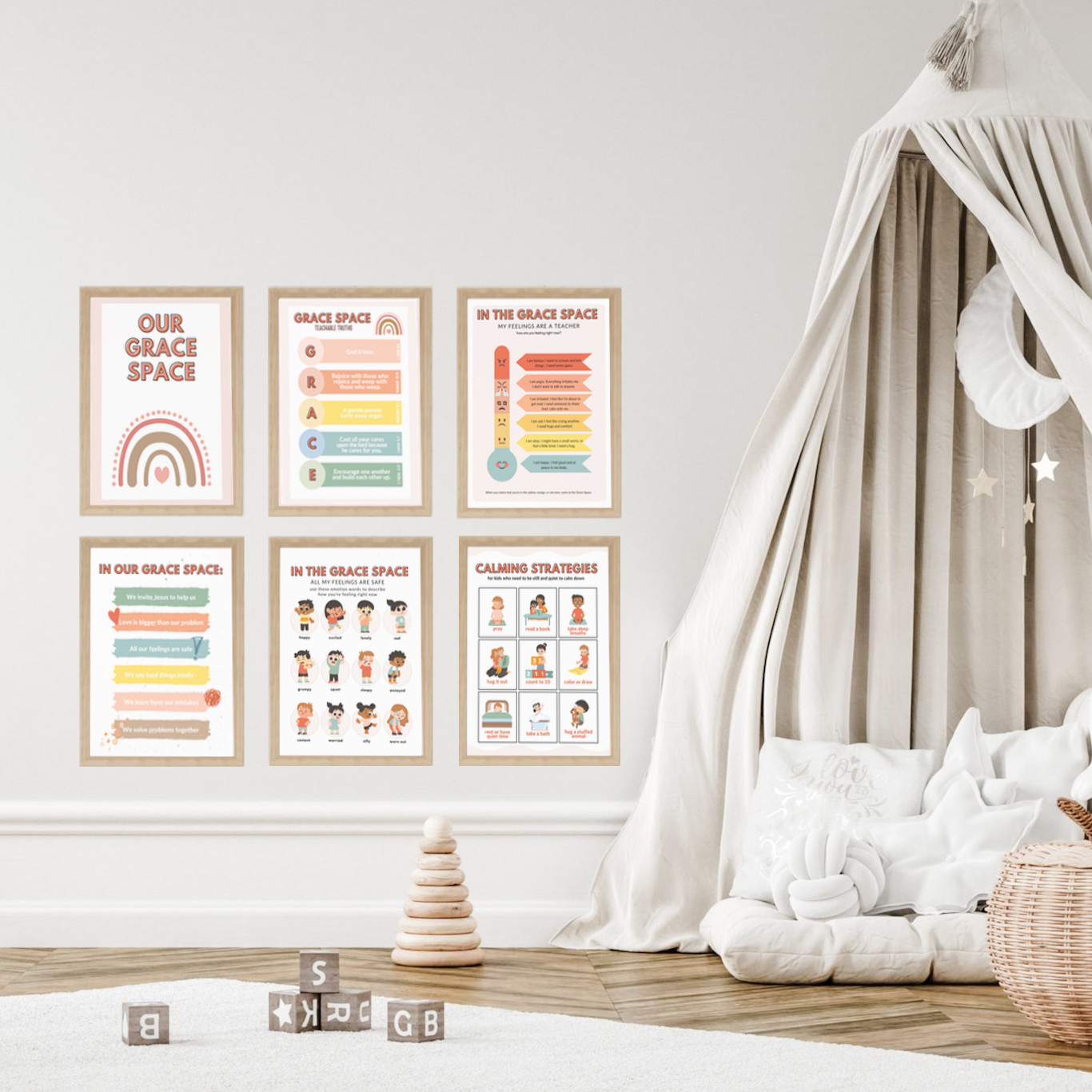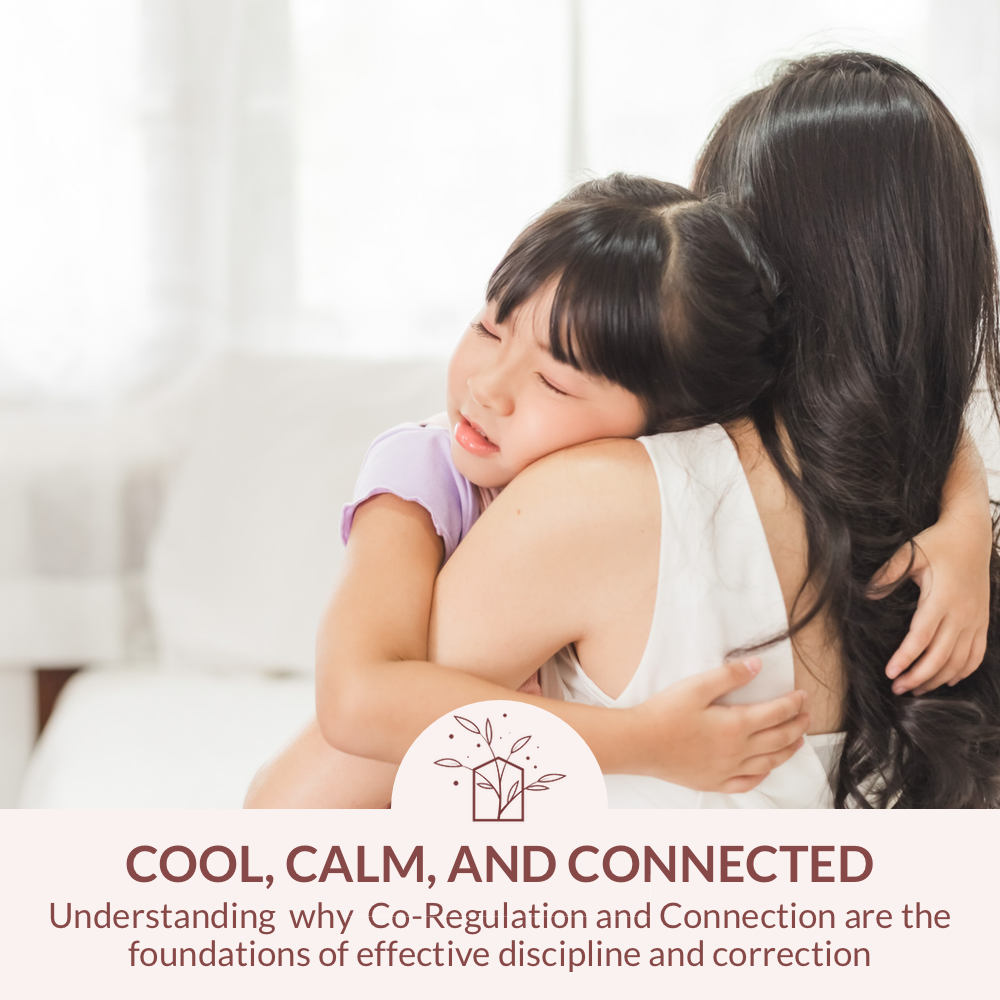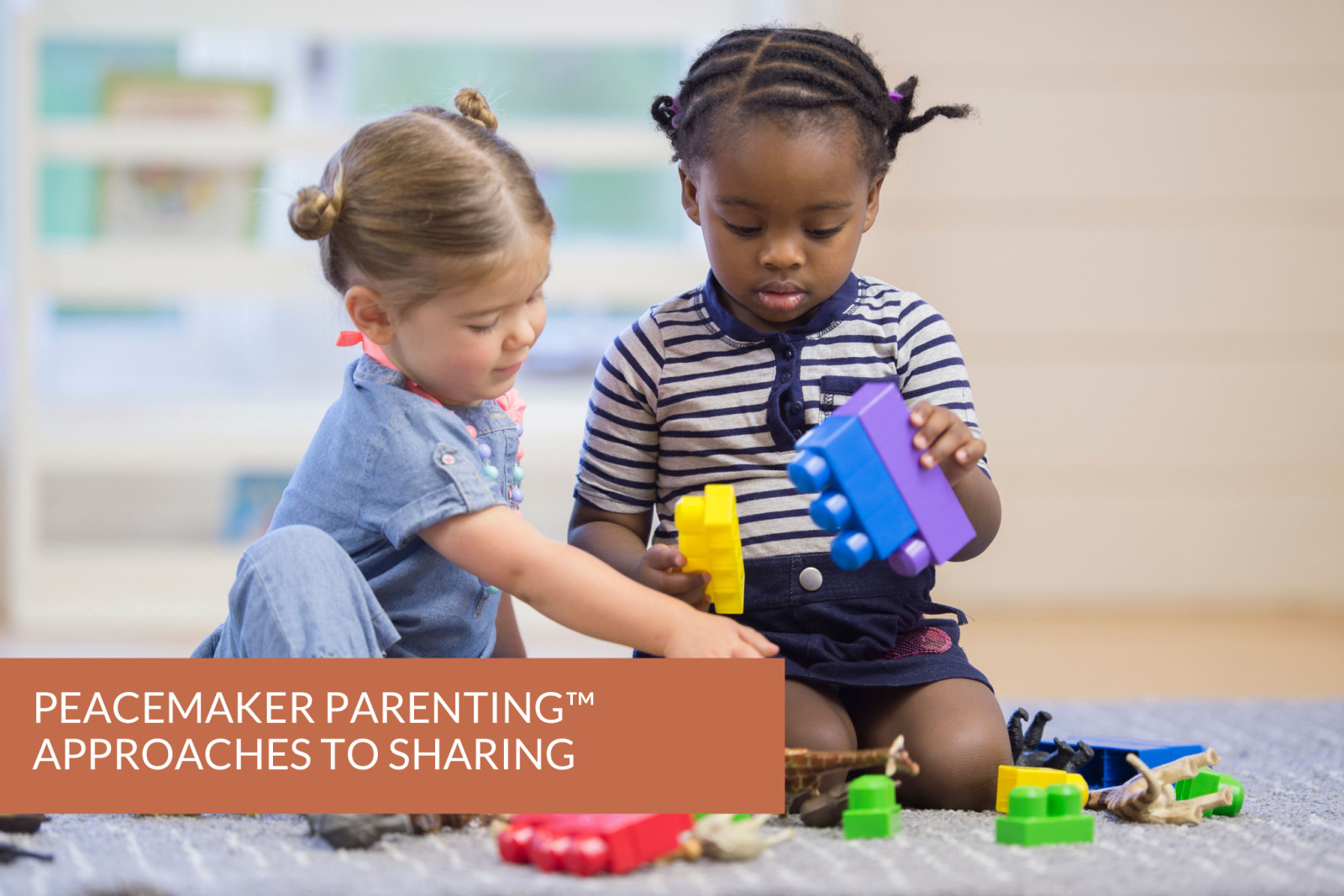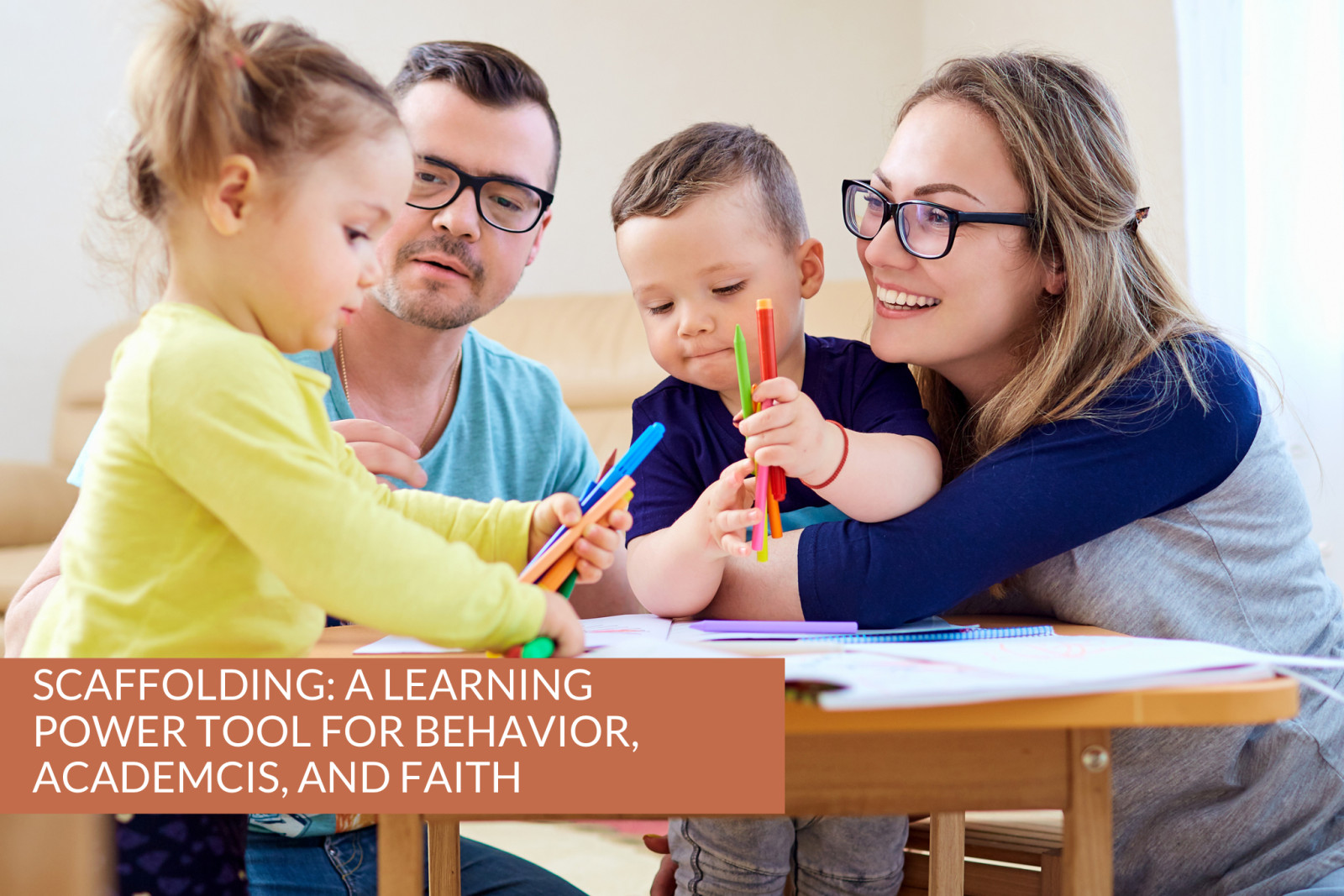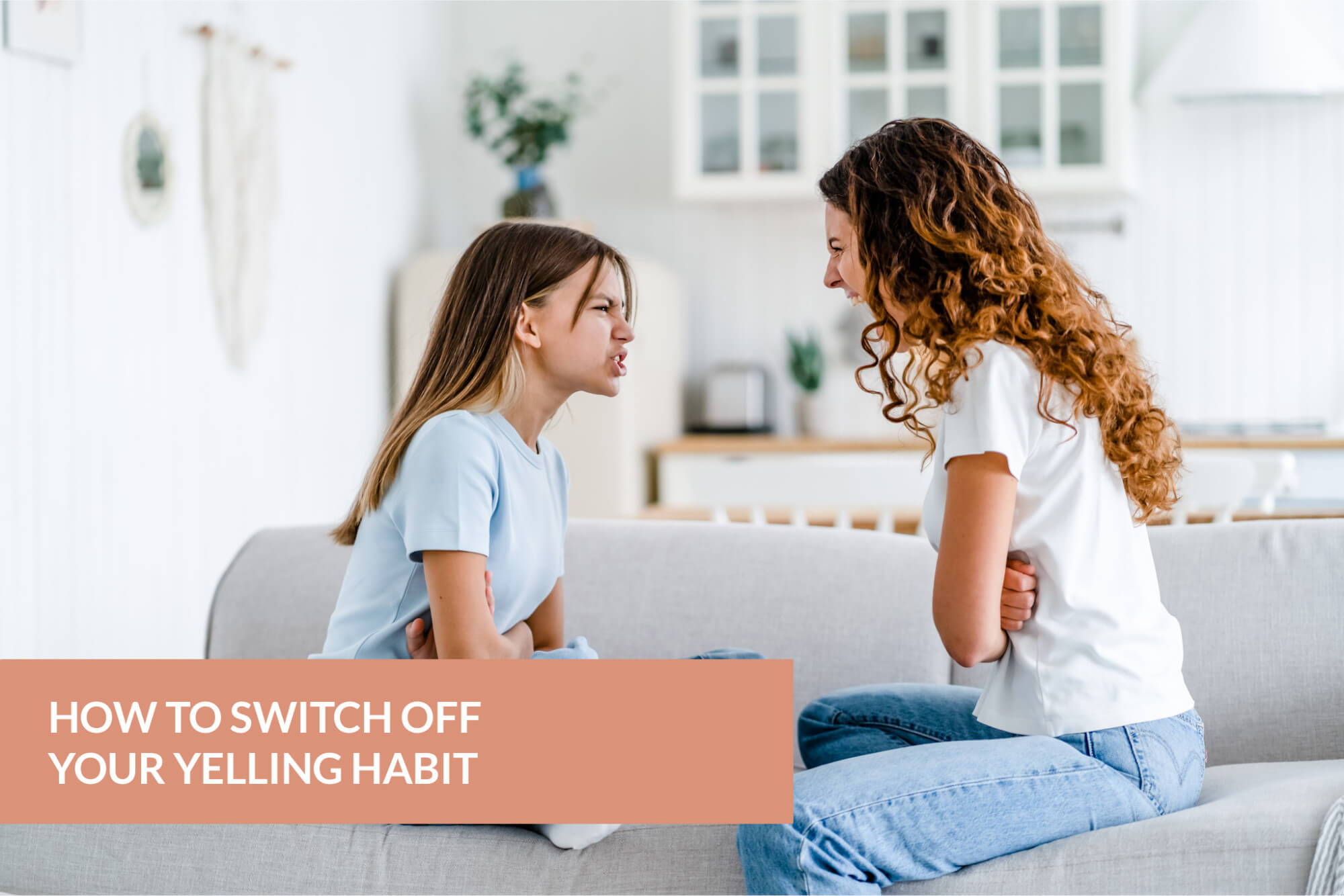
I used to be an angry, yelling mom. Postpartum anxiety left me feeling ragey over every little thing. Too many toys on the floor? Yell at my toddlers to pick them up. Blueberries dropped on the kitchen floor? Yell at them that food belongs on a plate, not the floor. Fighting over a toy? Yell at them that it's not okay to hurt each other! Yes, I even yelled at them to stop yelling in the house.
I knew yelling when it wasn't an emergency was harmful to my children's developing brains and to our relationship. And I was committed to changing and doing better. But for me, learning not to yell took time and effort. (And yes, since my rage was the result of postpartum anxiety, it required addressing the root issues as well,)
One of the tricks I used to keep from yelling was to sing or use a "shocked queen" voice when I caught myself yelling or felt the urge to yell. Over time, I learned to SWITCH off my yelling habit. Here's what I mean:
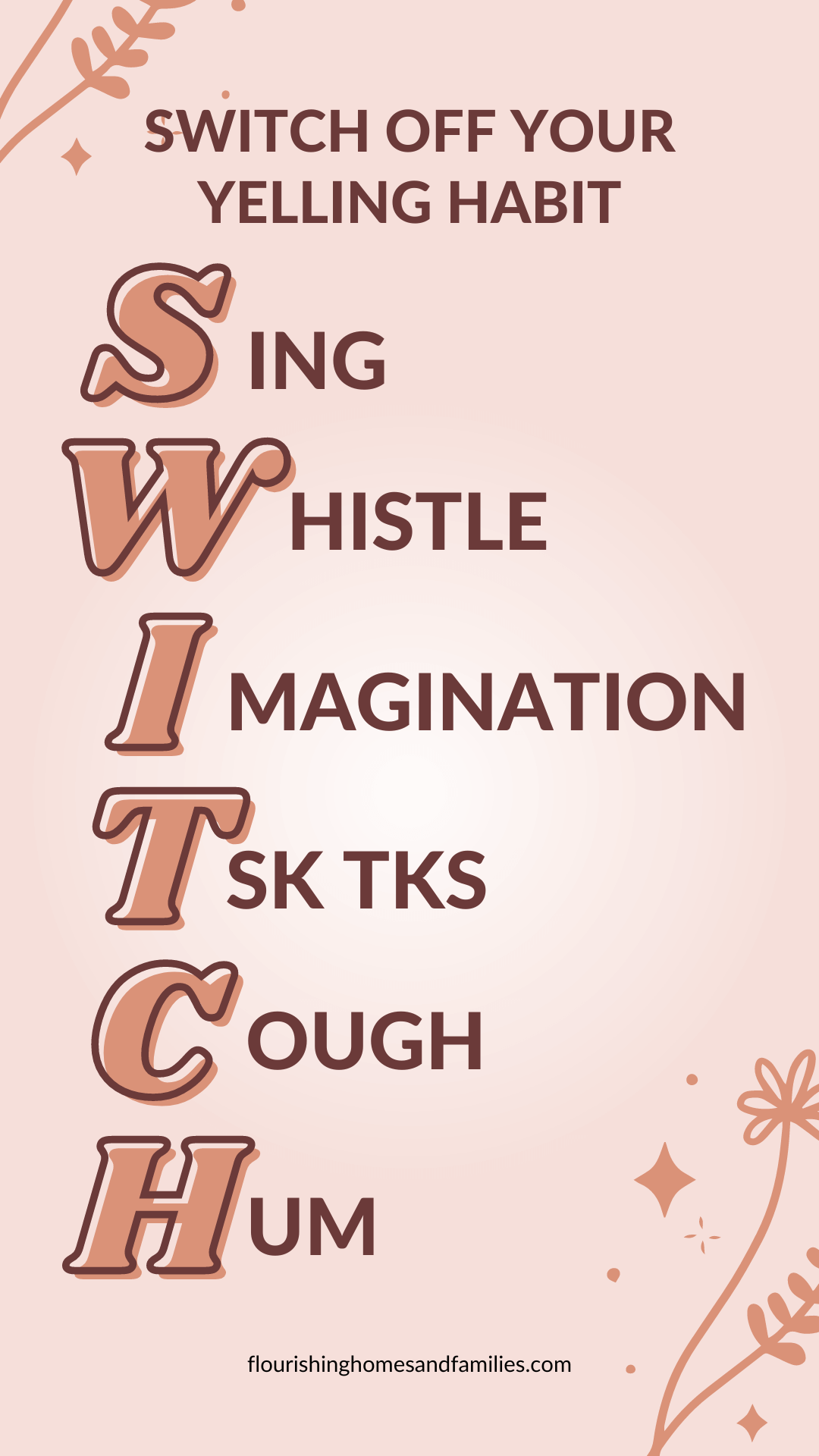
Interrupt your neural pathways
Whether yelling was passed on to you from your parents, or you started using it out of desperation, once your brain learned to use yelling as a parenting tool, it formed a neurological pathway that makes it really, really easy to resort to yelling. As you work to transform your parenting triggers, create new responses, and use new parenting tools you have to create a "roadblock" on the old pathway so your brain learns to take the new pathway - or new response. Here are some "roadblocks" you can use to S.W.I.T.C.H to a new response so you can start developing new habits.
Start Singing
This is a great tool to use when you're feeling frustrated, or when your kiddo doesn't seem to be listening. Singing has been found to reduce cortisol (the stress hormone) in your body, and because it is a tool for building connection with your child, it can help ease tensions and help you communicate in a less threatening way. Example: kids fighting over a toy - Sing: "You can come up with a plan, to share between two brothers. Or you can put it in my hand, and it will stay with mother. Until you come up with a plan that shows kindness to each other. The great thing with kids is that you don't even have to use a familiar tune! It's fine to totally wing it!
Whistle a Tune
When you catch yourself yelling, switch to whistling a tune for just a few moments. Not only will this serve as a "roadblock" to redirect your brain to the new habit you're working towards, it can also help calm your stress response. Whistling forces you to breathe through pursed lips, which is a proven way to slow your heart rate and calm your central nervous system. Plus, whistling has been found to lighten your mood. If you can't whistle? Don't worry! You can blow through your lips as if you're whistling, and still get the stress- calming benefits.
Imaginative Play
Playfulness is a tried and true way to connect with your child. When you catch yourself yelling, switch to imaginative play to help ease the tension that just exploded. Example: Child isn't cooperating at bed time, and you've just yelled to get in the bath or else... "Or else, when your feet turn to flippers you're going to fall straight to the ground and start flapping and flopping like a fish out of water! It's just about time for mermaid flippers to show up!" You can use any and all imaginative play, and the great thing is that you don't necessarily have to stop yelling! You can continue with the momentum, but shift it to playfulness and silliness.
Tsk, Tsk, Tsk
This one is handy because you can use that *tsk tsk* sound that's notorious for communicating shame, and use it positively instead! When you catch yourself yelling, switch to a Tsk...tsk. sound between your teeth. That sound is an alveolar formed by suction in your mouth, and you can use it to settle your nervous system and interrupt your old neural pathway. Be careful with this one, though. If you're overly hard on yourself, or struggle with guilt and shame, either skip this one, or only use it intentionally and without shaming yourself or your child.
Cough, Cough
It's a bit surprising, but coughing - a really good, guttural cough, can help lower your heart rate by stimulating the vagus nerve. That's why this is a great tool for interrupting yourself when you catch yourself yelling. You already have a bit of force coming out of your mouth - simply redirect it to a few good, hard, coughs to help lower your heart rate and re- wire your brain. Once you've accomplished the task of interrupting the old habit, remember to practice your new response to replace yelling.
Hum...
Kind of like whistling, humming is a great tool to switch off your old habit of yelling. Humming has been found to be a natural way to self soothe, as it reduces stress and induces calmness throughout the body. Humming can be used in place of mindful breathing to softly force air out of your belly. And lastly, humming is known to elevate one's mood and promote feelings of peace and happiness. Tip: Have a song in mind that will be your go-to when you catch yourself yelling. Don't assume you'll be able to come up with one on-the-spot!
Need more helping taming your parenting triggers? Check out our Transform Your Parenting Triggers workshop, it's helped thousands of parents understand and heal their triggers so they can parent with peace and purpose.
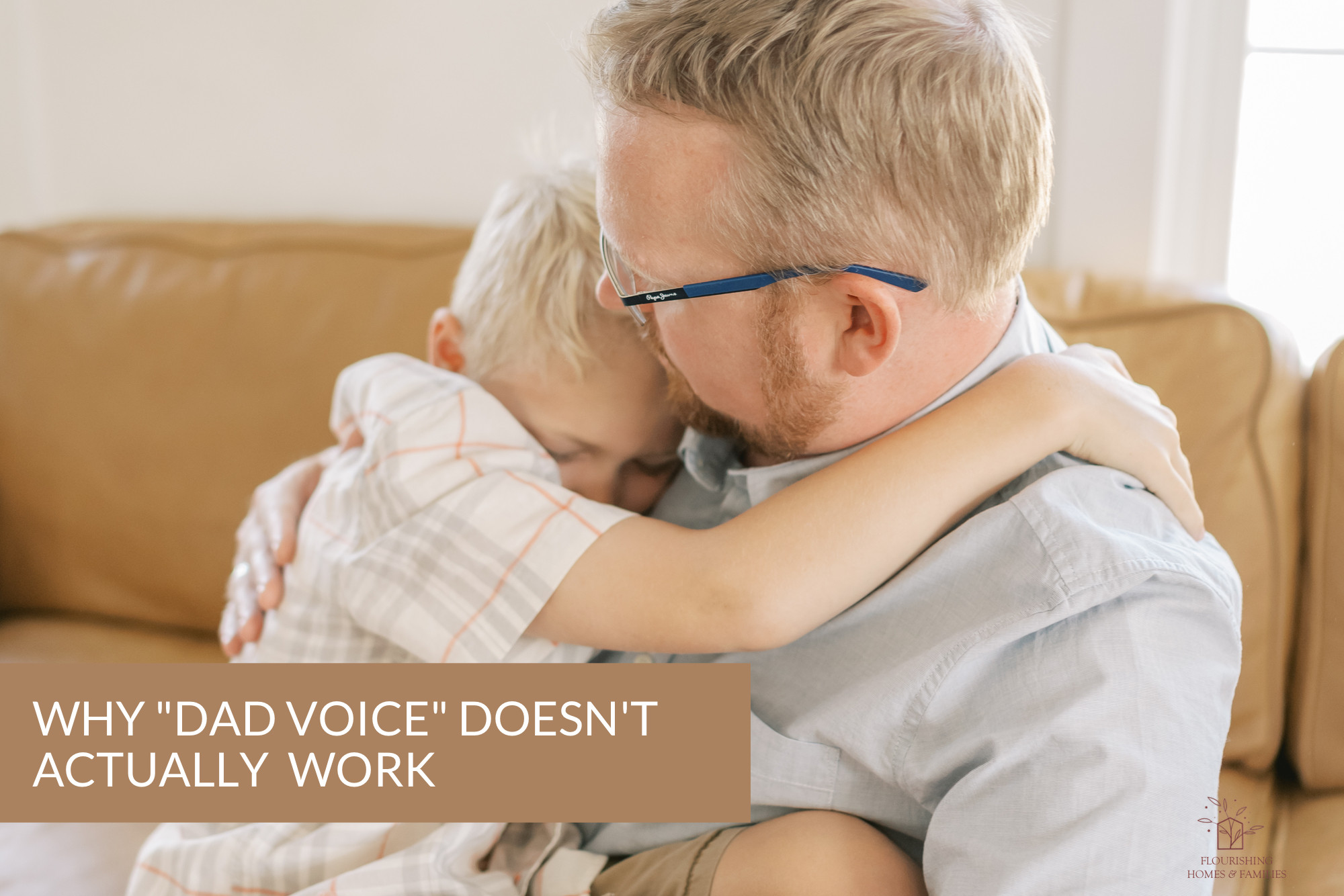
I never expected I would be a parent who yelled at my kids. I'm typically a pretty quiet guy. Unless I'm proclaiming God's Word. Plus I'm usually a pretty patient person. At least that's what I thought before I lived with toddlers.
But as my son got older I got into the habit of using my "Dad voice." You know the one. The one that stops you in your tracks. The one that clearly re-asserts parental authority. The one that reminds you that Dad is a whole lot bigger than you are. Why did I use it? Because it seemed to work. It would instantly stop whatever misbehavior was happening.
There was just one problem. It made it impossible to actually discipline my son. Sure the behavior was stopped, but he wasn't learning anything from me. Once I went into Dad Voice, he stopped listening to my words and only heard my tone. His brain went into fight-or-flight mode and his sole focus was on escaping the interaction as quickly as possible. Which meant he learned nothing. Which meant we were probably going to do it all over again very soon. My Dad voice was a failure.
So what did I do? I kept working at not channeling my frustration into my voice. I continued to practice consciously choosing a calm voice before entering a situation. I kept choosing to do better as much as I could, until using my calm voice became a habit. I'm still not perfect. I used my Dad voice once last week. It still has the same effect. I'll keep working on it.
But as my son got older I got into the habit of using my "Dad voice." You know the one. The one that stops you in your tracks. The one that clearly re-asserts parental authority. The one that reminds you that Dad is a whole lot bigger than you are. Why did I use it? Because it seemed to work. It would instantly stop whatever misbehavior was happening.
There was just one problem. It made it impossible to actually discipline my son. Sure the behavior was stopped, but he wasn't learning anything from me. Once I went into Dad Voice, he stopped listening to my words and only heard my tone. His brain went into fight-or-flight mode and his sole focus was on escaping the interaction as quickly as possible. Which meant he learned nothing. Which meant we were probably going to do it all over again very soon. My Dad voice was a failure.
So what did I do? I kept working at not channeling my frustration into my voice. I continued to practice consciously choosing a calm voice before entering a situation. I kept choosing to do better as much as I could, until using my calm voice became a habit. I'm still not perfect. I used my Dad voice once last week. It still has the same effect. I'll keep working on it.
What if your child could learn real respect without you demanding he give it? What if you could teach our child to obey without forcing her to do everything she’s told? What if you could do all these things while building a relationship of honor with your child? Honor that outlasts our child’s childhood? Do you desire to instill values of honor and respect in your children, but sometimes find it challenging? We understand your concerns, and we're here to help.
Here's what past attendees have to say:
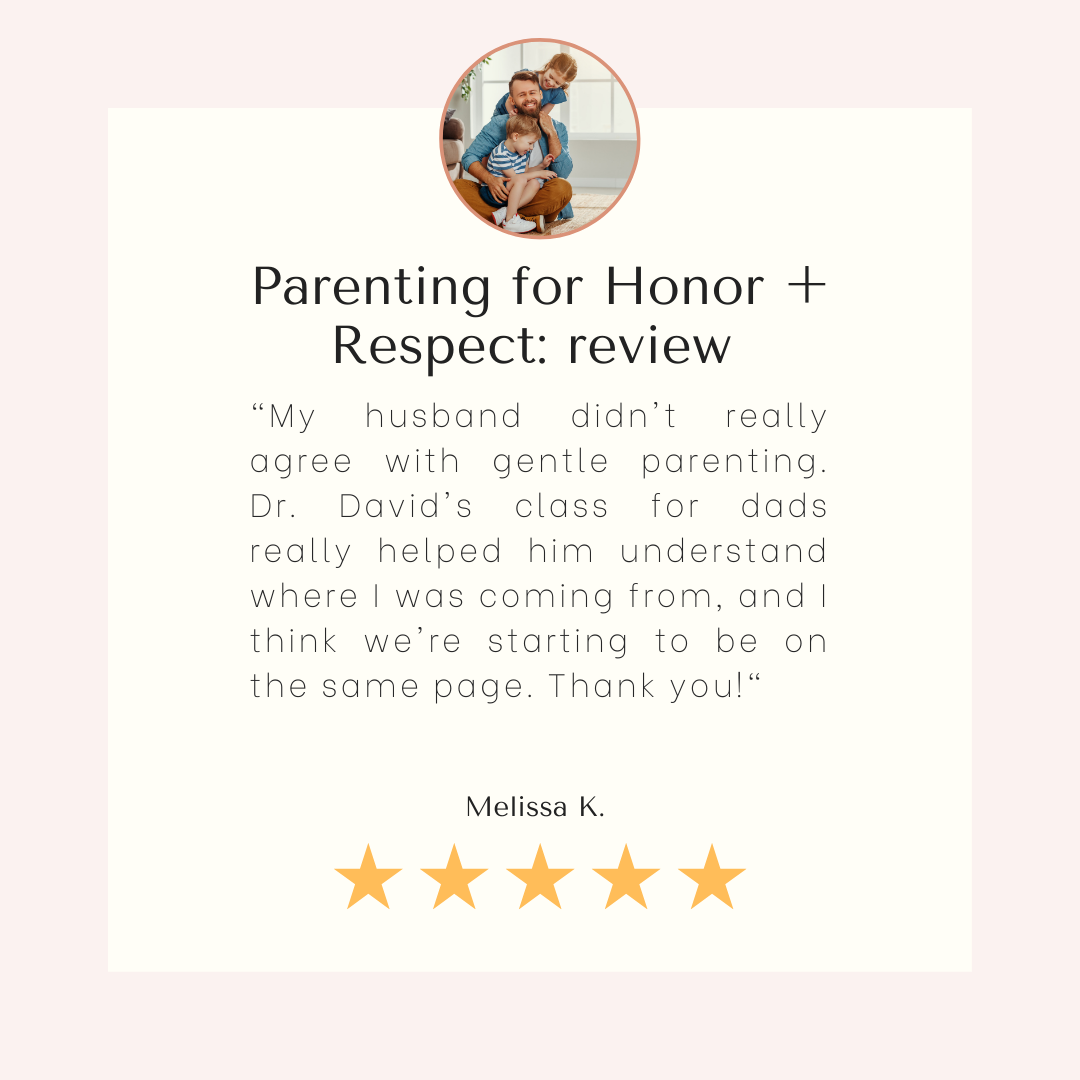 | 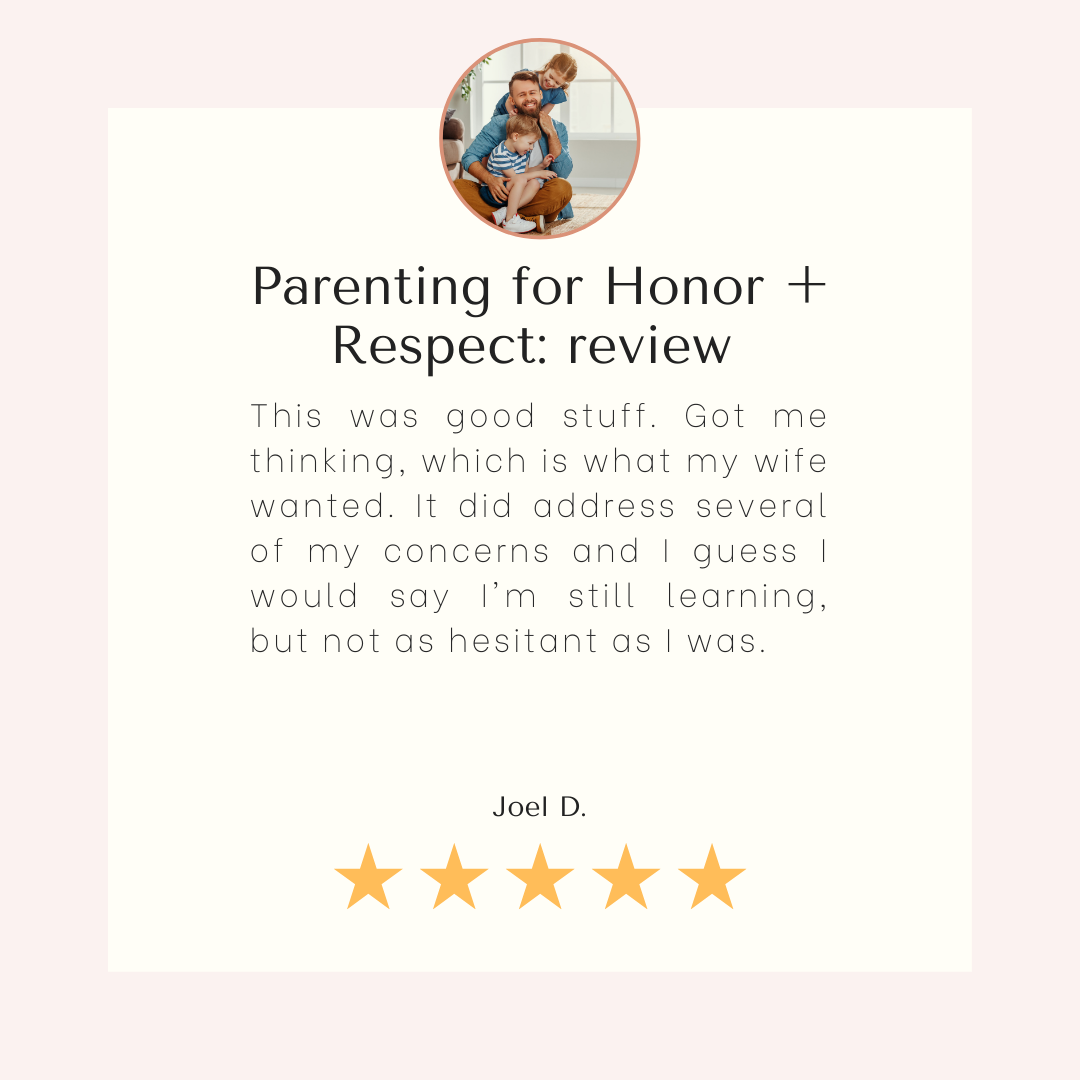 |
You Might Also Like
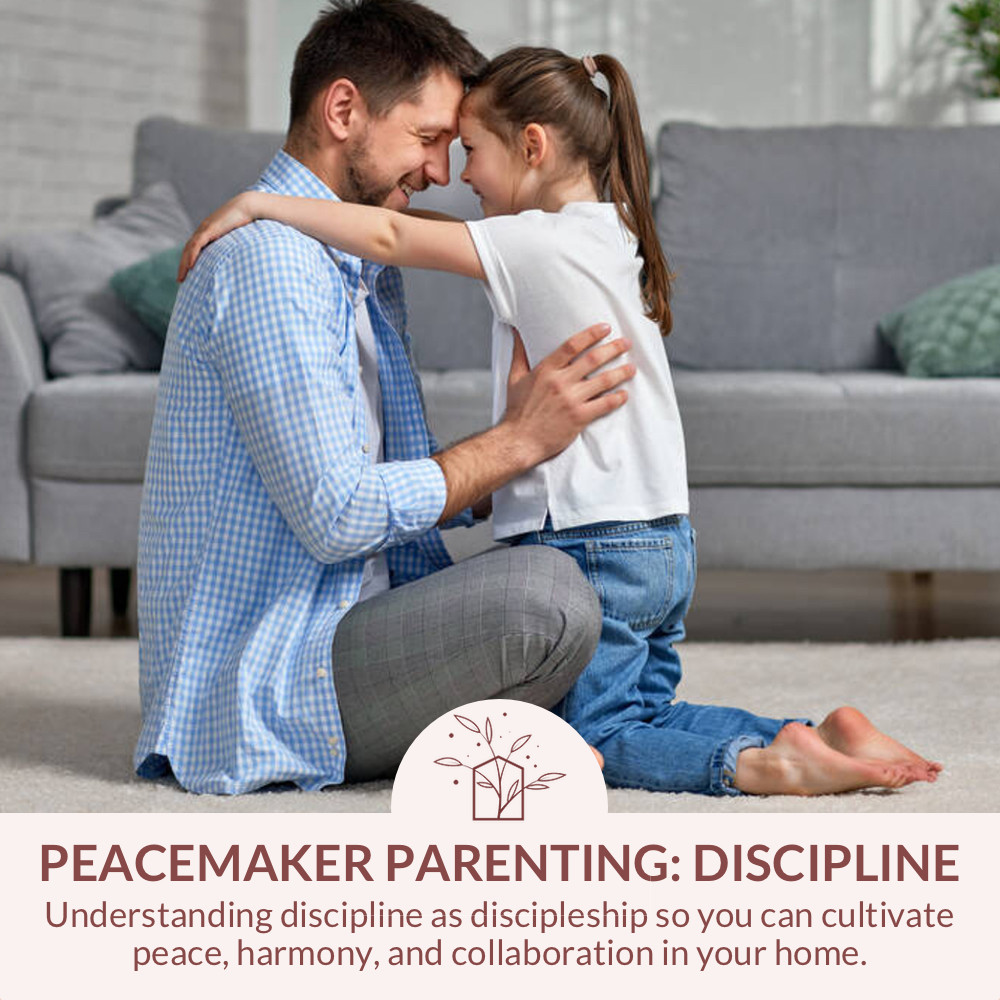 |  |

This one's for the mamas, for the ones who sometimes think, “These kids bring out the worst in me?!”
Imagine with me that your impulsive, irrational, exhausted little one is on the verge of pushing your last button. You can feel yourself about to lose your cool, and that’s when the thought crosses your mind: “Arghhhh this kid brings out the worst in me!” We’ve all been there, right? Cue the mom guilt.
This is the exact moment to practice the power of the pause. I totally get that that sounds a little whimsical and a lot cliche, neither of which are all that helpful when you’re patrolling the streets of Meltdown City. But stick with me.
See, that pause is powerful. It gives the Holy Spirit space to nudge your heart, and it gives you space to hear it. That inner voice that quietly counters your own exasperation, whispers, “Or you can choose to let him bring out the BEST in you. Patience. Kindness. Self-control. Empathy. Inner strength that he doesn’t have. You can choose to let him bring out CHRIST in you.”

Talk about powerful! In that split second, we get to choose to let our little ones bring out the worst in us or to let him bring out the BEST in us. And we get the glorious responsibility, and holy work, of choosing!
I want to encourage you today, as a mama who is in that split second of choosing way too often, to be sensitive to those tiny moments when you get to pause and choose. The most effective way our little ones will learn respect and self-control is by seeing respect and self-control in action! I’m preaching to myself here because motherhood is such an opportunity to become more like Christ, and I know I’m not alone in needing the reminder to choose well!
AND FOR WHEN YOU CAN'T CHOOSE
I also want to acknowledge the mamas who feel like they can't choose. When I was deep in postpartum anxiety I experienced rage unlike anything I've ever known. And the hardest thing was that I knew it was wrong, I wanted to change, and in some of the most triggering moments, I couldn't stop the intense reaction and anger coming out of my body. And yes, it landed all over my kids.
I completely understand that reading "You have the power to choose!" can feel disempowering because, in some of those more irrational moments, you would choose to do differently if you could. First, when you can choose, do. Practice it and start over in the middle of an outburst if you catch yourself reverting to old habits. (Neuroscience shows us that even when we start off down an old, unhelpful reaction, stopping and changing in the middle of it helps rewire our neural pathways for future growth and change!)
Secondly, consider getting help. We've shared lots of resources here and on social media. But if you're still experiencing frequent moments where you can't control yourself, please consider talking to your doctor or healthcare provider. I personally benefited greatly from talk therapy and nutritional adjustments. Sometime's Christ's work in us comes from medical and mental health professionals.
You might like:

As a parent or caregiver, it's common to feel overwhelmed and stressed. Knowing how to care for our nervous systems so that we avoid burnout and chronic dysregulation is vital not only for our own health but for our ability to help our children regulate as well. It’s often easy to know when your nervous system is activated. Some of the obvious signs are that you feel like you’re on the verge of losing it! But what does a regulated and calm nervous system actually feel like? Let’s take a look:
What is the nervous system anyway? The nervous system is a complex network of cells and nerves that move information throughout the body. When it is regulated, it functions smoothly, allowing us to feel calm, focused, and in control. In contrast, an unregulated nervous system can lead to feelings of anxiety, stress, and overwhelm. The truly remarkable thing about our nervous systems is that they not only transmit information within our own bodies, they communicate with each other's nervous systems as well! This is why some experts say that a family is one nervous system. As parents, our own nervous systems inform the nervous systems of the entire family.
What does a regulated nervous system feel like emotionally? When your nervous system is regulated, you will feel a sense of balance and equilibrium. You are able to respond appropriately to stressors without becoming overwhelmed, or over-excited, and you can recover quickly from difficult situations or stressors. While you will still experience frustration, fear, anger, and sadness, those emotions are manageable and don't interrupt your day. You're able to think clearly and make decisions with ease.
What does a regulated nervous system feel like physically? Physically, a regulated nervous system is evident in a number of ways. Your breathing will naturally be slow and deep, your heart rate will be steady, and your muscles will be relaxed. You may also feel a sense of warmth and comfort in your body (as opposed to tightness in your chest or a knot in your stomach), indicating that your parasympathetic nervous system is activated and your brain and body feel safe.
This is just a place to start. If you recognize that your nervous system is dysregulated much of the time, these ideas are just a place for you to start on the journey to learning how to regulate your brain, body, and spirit. Regulation doesn't happen overnight, and it isn't a one-and-done event. It's something you'll learn to do over and over again until your state of activation becomes fewer and farther between.
You may want to look into:
- Deep pressure
- Mindfulness
- Meditation and prayer
- Journalling
- Vagus Nerve Stimulation
- Somatic Therapy
This isn't about shaming parents who feel dysregulated most or all of the time! I've been there, and I know how hard it is. My goal is to bring awareness and practical steps you can take to nurture and support your own nervous system so you experience more peace in your body, mind, and spirit.
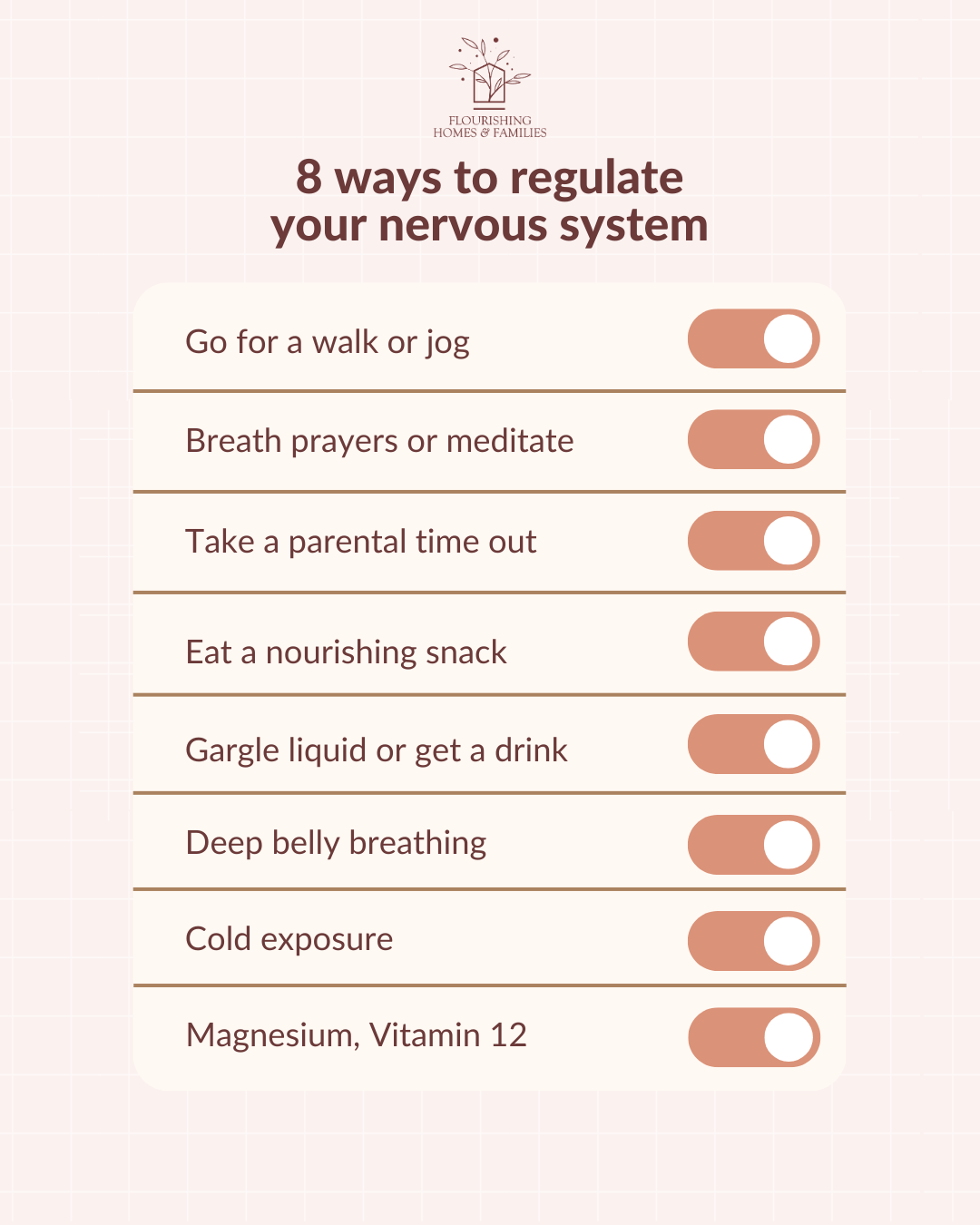
A note about Magneisum and Vitamin B12
Magneisum is a vital nutrient for every body system and has been found to be soothing to the nervous system. (Magnesium Glicinate or Magnesium L Threonate are the most beneficial.)
VITAMIN B12 is essential for nerve health and brain function. The human body cannot generate this, so it is important to source foods that are rich in B12 or take a Vitamin B 12 or B Complex supplement.
Want to learn more? Our Cool, Calm, and Connected workshop explores various ways to regulate your body, mind, and spirit, and will help you understand the power of co-regulation.

I want to talk a little bit about what it means to be a place of peace for your child.
Sometimes, in the trying moments, we may feel the need to step away from the situation or our child so we can calm down. We certainly all need to just take some space from the crisis sometimes. But I want to remind you that we as parents are gifted not with our own inner peace, but with the peace that comes from abiding in Christ.
“I am the vine, you are the branches; he who abides in Me and I in him, he bears much fruit, for apart from Me you can do nothing.” John 15:5
Jesus, while speaking with His disciples, spends a great deal of time explaining that the safe place for them is abiding in Him as their place of peace, ability, and safety because Jesus is abiding in the vital source of life in all its fullness–God himself.
As parents, we do not take the place of Jesus, but we do build our model after Him and we see that He offers us a space within Himself that allows vulnerability and protection.
When we understand abiding in Christ and live in this every day, we are able to be that place of peace for our children because we abide in Christ, and Christ abides in the Father. We are offering ourselves to be a link in the chain that helps connect our children with their creator.
One does not simply bounce in and out of this abiding business. It is a conscious choice–a lifestyle. But it isn't quite as easy as giving you a checklist of things to mark off to make sure you're abiding in Him. How I wish it were that easy!
Ultimately, abiding in Christ is not about doing all the things, rather it is resting in our identity in Him.
When we find our true identity in the One who created us, we are freed from misplacing our identity in the things that so quickly tempt us: how tidy our homes are, how obedient, how many Bible verses we have memorized, how much we accomplished around the house or for the Kingdom.
We do not have to strive for, work for, negotiate or argue for, defend, or take credit for Christ’s unconditional love for us.
He is just as much at work in us when we’re dancing in praise to Him as when we’re dancing around toys on the floor. His faithfulness to us is just as steadfast when we read our Bible for an hour as it is when our Bibles sit in the car forgotten since last Sunday. His peace is available to us as reliably when our children are tucked snuggly in their beds and the house is quiet as it is when chaos ensues and screaming and crying and tantrums are the soundtrack to our days.
How I wish I could give you the indescribable gift of this freedom: abiding in Christ is about His faithfulness and goodness, not about how hard we’re holding on to Him. Jesus-Centered parenting, abiding in Christ is giving radical surrender to our weakness so that we can depend wholly on His strength. The world tells us to defend, hide, be ashamed of it, and deny our weakness. Jesus invites us to welcome our it as a sacred reminder to abide in Him and His strength.
To be sure, we can develop holy habits that remind us of Christ's faithfulness. But we must recognize that these habits are about being with Him, not about doing more or trying harder.
Ultimately, as we abide in Christ we will begin to see evidence of His work in us:
The fruit of the Spirit:
One of the evidences we are abiding in Christ is by bearing fruit–we are told what some of those fruits look like. I find that being familiar with something and putting those things into practice can be two totally different things. It may be a good idea to make a chart or write them out in a place where they are continually before your eyes as you a reminder of the work He is doing in you and through you. Yes, you may have to practice gentleness and peace many times over! But the work isn't yours to do alone! But the fruit of the Spirit is love, joy, peace, patience, kindness, goodness, faithfulness, gentleness, self-control; against such things there is no law. Galatians 5:22-23
Looking for opportunities to learn from Jesus:
How do we do this? Make time to spend with Jesus. For some people that looks like taking a chunk of time in the morning to soak in the word and be in prayer. For others in more busy seasons, it may simply be taking time to pause and bring the Lord into your day, or using the chromecast to put on a scripture playlist while you’re busy at home. Whatever the case may be, abiding in Christ looks like being drawn to spend time with Jesus and learn from Him how we can put His model Kingdom way of living into practice as a parent. Take my yoke upon you. Let me teach you, because I am humble and gentle at heart, and you will find rest for your souls. Matthew 11:29
Letting the Peace of God rule in your heart:
This is simple–stop striving for peace as though it’s something you can wrestle down. Remember who the Lord is and that He is always a non-anxious presence whom you can trust. Don’t let your mind be led down all sorts of rabbit trails. Practice, instead, letting the peace of God rule in your hearts. It’s not something to force. It is something to simply allow. It may take some practice, but if Jesus told us to, I can promise you it is worth it. Let the peace of Christ rule in your hearts, to which indeed you were called in one body; and be thankful. Colossians 3:15
Your unique story needs to be told in unique ways.
God is writing the beautiful story of you. The failures, conflicts, and struggles that arise in your story are part of what makes you unique. We know that the application of the scriptures we shared may very well look a little bit different for each of us, but ultimately, they will all point to Jesus.
When we focus our energy on being peaceful, regulated, and steadfast we are able to bring those things–and Jesus– into every situation.
This abiding does not fail us because Jesus doesn’t fail us. Instead, it brings peace to the chaos and our children are able to regulate and be at peace much more easily when we are doing just that.








